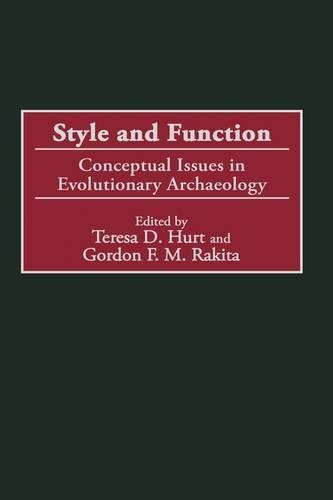
Style and Function: Conceptual Issues in Evolutionary Archaeology
(Hardback)
Publishing Details
Style and Function: Conceptual Issues in Evolutionary Archaeology
By (Author) Teresa D. Hurt
By (author) Gordon Rakita
Bloomsbury Publishing PLC
Praeger Publishers Inc
30th October 2000
United States
Classifications
Tertiary Education
Non Fiction
Archaeological science, methodology and techniques
Archaeology by period / region
Evolution / Evolutionary biology
Anthropology
930.1028
Physical Properties
Hardback
240
Width 156mm, Height 235mm
539g
Description
The topics of style and function within evolutionary archaeology have been the subject of great debate in the field of archaeology in general over the past two decades. Evolutionary archaeologists have a unique perspective on these concepts-one that has sometimes been misunderstood by archaeologists working within other theoretical perspectives. The dichotomy between style and function was first formulated in the late 1970s by Robert Dunnell and remains axiomatic within the theoretical perspective of evolutionary archaeology. The original definitions of style and function were grounded in biological evolutionary concepts regarding neutral variation versus variation that is subject to natural selection. Several chapters expand upon these concepts, and explore how Darwinian evolutionary theory may be used to understand the archaeological record. Other chapters demonstrate this application through empirical case studies. Dunnell provides a foreword introducing and re-examining his original thesis. This volume is the only text devoted to the topic of style and function within the literature of evolutionary archaeology. It provides not only theoretical discussions and augmentation, but also significant historical background regarding the development of the style/function distinction within archaeology. Moreover, it presents several case studies that provide examples of how evolutionary style and function may be applied to the prehistoric record.
Reviews
"The authors build upon Robert Dunnell's 1978 evolutionary definition of the term and demonstrate decisively that style and function are theoretically distinct as well as critical to evolutionary archaeology....The insightful papers in this volume should encourage students and professionals alike who are frustrated by the current state of disarray in archaeological theory. This collection will be influential in keeping Robert Dunnell's vision of an evolutionary archaeology alive and in stimulating further exploration of the fundamental dichotomy of style and function."-William S. Dancey Associate Professor of Anthropology Ohio State University
.,."provides a welcome change to re-evaluate the growth and development of the cultural historical paradigm, assess its continuing influence, and consider its relation to current ethical issues...should also play a significant role in reminding current archaeologists of the forgotten and unappreciated complexities of the Americanist cultural historical paradigm as it developed during the first 60 or so years of the 20th century"-North American Archaeologist
...provides a welcome change to re-evaluate the growth and development of the cultural historical paradigm, assess its continuing influence, and consider its relation to current ethical issues...should also play a significant role in reminding current archaeologists of the forgotten and unappreciated complexities of the Americanist cultural historical paradigm as it developed during the first 60 or so years of the 20th century-North American Archaeologist
..."provides a welcome change to re-evaluate the growth and development of the cultural historical paradigm, assess its continuing influence, and consider its relation to current ethical issues...should also play a significant role in reminding current archaeologists of the forgotten and unappreciated complexities of the Americanist cultural historical paradigm as it developed during the first 60 or so years of the 20th century"-North American Archaeologist
Author Bio
TERESA D. HURT is a doctoral candidate in anthropology at the University of New Mexico, and a Project Director at Lone Mountain Archaeological Services, Inc., in Albuquerque, New Mexico./e GORDON F.M. RAKITA is a doctoral candidate in anthropology at the University of New Mexico./e
